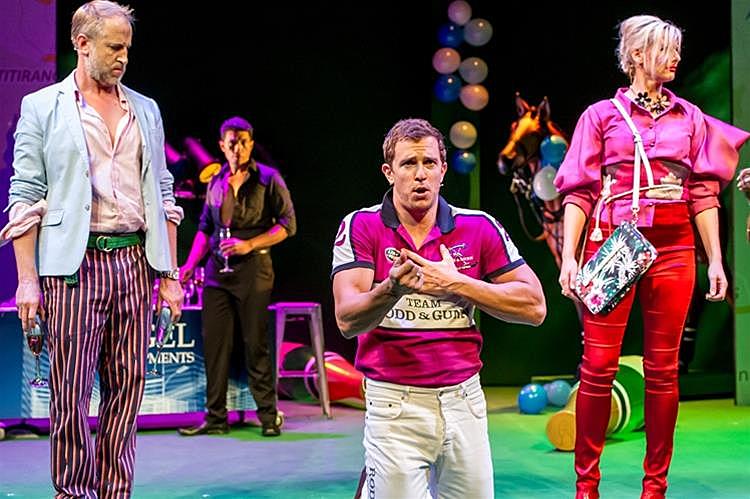Review: Polo
Sam Brooks reviews ATCs' new show Polo
Auckland Theatre Company’s Polo claims to lift the lid on the city’s rich-listers, but ends up as a string of limp jokes that lack bite.
There’s a scene in the excellent Joan Rivers documentary A Piece of Work where the comedian shows the camera all the jokes she has written over the years and how they’ve been carefully written down and stored in cabinets. These cabinets fill an entire room of her office, and the jokes are arranged by date and subject, which range from Angelina Jolie to Joan Rivers herself. It’s a stunning display of the comedian’s longevity and attitude to her work.
In its worst moments, Polo feels like someone cranking out all their jokes about upper-class, National-voting people and a type of Aucklander that is presumed to exist but actually doesn’t. Even in the moments where it does work, it feels like a soft lob at people who already agree with its slightly-to-the-left-of-moderate standpoint.
Satire is meant to skewer those in power and open up an audience to injustice and hypocrisy. Polo doesn’t do this. What Polo does instead is half-heartedly play on the beliefs the presumably left-leaning audience already have: that right-wingers who vote National are unsympathetic monsters who are barely even people.
The premise of Polo is simple. There is a polo game out in Clevedon that a group of wealthy Aucklanders will be attending. These include a National MP, her property developer husband, the polo event’s publicist, two girls from St. Cuths, a vaguely socially conscious, closeted polo player and a wayward son who’s failingat being an upper-classwhite man. There is also a mostly silent young waiter, Matiu, who lives with a girl named Amber. Amber raves about things that Young People™ do, like buying a lemon tree to plant in the local park or blow bubbles in their lounge for no reason.
The plot is a cavalcade of cliché. There is an affair between the unfaithful property developer and the publicist, there is bisexuality played for laughs, there is 90s racism, there is a surprisingly clean teenage break-up and there is political scandal that is a bizarre and troubling reframing of the Judith Collins-Oravida scandal, casting Collins as the innocent party. All of this is talked about rather than experienced or seen. Any action that could bring life or nuance or conflict to the proceedings is handled offstage, and we instead hear about it later.
The cast do their best, but there’s not a lot to work with. Lisa Chappell is as charismatic as she’s ever been as a National MP, and when she goes full Joan Crawford she’s the most watchable thing onstage. Harry McNaughton puts himself at a distance from the proceedings, playing things with an appealing deadpan to show the polo player’s lack of interest in everything that’s going on around him. Katrina Wesseling and Hannah Paterson are very fun as two best friends who are vapid to the point of being outright evil, and when they’re onstage together the play sparkles and it feels like we’re watching people, not paper cut-outs.
Dean Parker’s script doesn’t give the cast anything but jokes to work with. Polo is littered with scenes that are, on a basic technical level, lists of jokes with no connecting material between them. The jokes aren’t rooted in specificity or character. Anybody in the play could say them if you shift around the pronouns. Nowhere is this more prominent that when we go back to Amber and Matiu’s house, where she rattles off places in Auckland along with an event or thing that might happen in that place, like a party in Mt Eden or a pool underneath the Newton bridge, while Matiu sits silently and waits for her to finish.
Polo is littered with scenes that are, on a basic technical level, lists of jokes with no connecting material between them.
Amber is a bizarre conundrum that the script never solves. It’s here that Parker reveals a conservatism that belies the politics he’s trying to convey here, although you could argue that the politics that Polo is trying to convey is ‘anything but these right wing nutjobs’.
Amber is seventeen, even though she talks more like a thirty-year-old hippie, who is repeatedly skewered by the script for being a seventeen-year-old, and a seventeen-year-old who is flatting, nonetheless.. We’re invited to laugh at her for her naive rants, just as we’re invited to laugh at everything that all the characters are saying. In another play, Amber would be our rock to sympathise and empathise with, but in this play she’s just another source of punchlines with no set-up. It’s a bizarre choice that makes the character seem like Parker’s attempt to even the scales, but it ends up throwing the entire play off-kilter.
There’s a scene late in the second half of Polo where four characters are standing in a line at the front of the stage and talking out at the audience. The actors don’t look at each other, but look at some point in the middle distance like chatty mannequins. It’s like every other scene in the play: there are jokes about property values, pandering to the voters and how hard it is to be rich. It’s an unnerving scene because of how flat it is. It could just as easily be a very cluttered stage at a Raw night at the Classic.
When you’re given flatness, you work with flatness. Colin McColl keeps the play moving along as quickly as it can. It’s hard to linger on a bad joke if there’s another one replacing it immediately, but there’s nothing to work with. The play is as vapid and shallow as the people it is critiquing.
There’s no reason the play had to be like this. Anybody who watches a late-night show knows that conservatism is full of joke fodder, and those jokes can be deep and intelligent, especially when they expose hypocrisy and dissonances within a point of view. There’s a lot of power in this kind of comedy, and especially this kind of satire, but Polo pulls the punches and loses both laughs and depth.
There’s no question that Parker is an incisive and political writer. He’s one of the most popular political playwrights in the entire country, but Polo is not a political play, or at least it isn’t in the way that it might be intended. We don’t come out of this challenged to think differently, we come out of this thinking exactly the same way that we’ve always thought.
But Polo is not that play, it’s a play being performed for left-leaning theatregoers who at a very basic level probably agree with every joke, and a theatrical style that is so conservative and dated that it would probably actually appeal to the characters in the play.
It’s John Parker’s set that provides the perfect metaphor for the play. A map of Auckland frames the actors, but there’s a massive hole in the middle for the action to play out on. This isn’t a play about Auckland, or at least not any Auckland I recognise.
Polo runs at
SkyCity Theatre
from February 12 - February 28
Buy your tickets here
See also:
James Wenley for Metro



